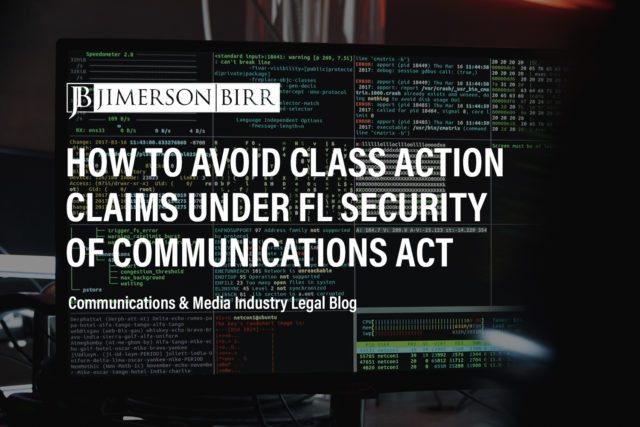How do communication and media law compliance and enforcement affect communications and media companies?
Communication and media law compliance and enforcement play a crucial role in shaping the operations of communications and media companies in Florida.
These laws encompass regulations related to broadcasting, telecommunications, internet content, advertising, and intellectual property rights. Compliance with these regulations is essential for communications and media companies to ensure legal operation and avoid potential penalties or litigation.
Similarly, laws concerning intellectual property rights protect the original works of content creators, such as writers, musicians, and filmmakers. Violating these rights through unauthorized use or distribution of copyrighted material can lead to costly legal disputes and damages.
Communication and media law enforcement agencies, such as the Federal Communications Commission (FCC) and the Florida Department of Agriculture and Consumer Services, oversee compliance with relevant statutes and regulations. They have the authority to investigate complaints, issue citations, and impose sanctions on non-compliant entities.
Need help regarding communication and media law compliance and enforcement? Schedule your consultation today with a top communications and media attorney.
In Florida, which laws and regulations apply to communication and media law compliance and enforcement?
In Florida, several laws and regulations govern communication and media law compliance and enforcement, including:
- Florida Communications Fraud Act: This law prohibits fraudulent activities related to communication services, including deceptive advertising and misrepresentation of services.
- Florida Deceptive and Unfair Trade Practices Act (FDUTPA): FDUTPA regulates unfair or deceptive trade practices in various industries, including communications and media. It provides consumer protection against false advertising and fraudulent business practices.
- Florida Telecommunications Act: This legislation outlines the rights and responsibilities of telecommunications service providers operating within the state. It covers issues such as service quality, billing practices, and consumer privacy.
- Florida Public Records Law: Also known as the Sunshine Law, this statute ensures public access to government records, including those held by communication and media agencies. It promotes transparency and accountability in government operations.
What are common issues regarding communication and media law compliance and enforcement that lead to litigation?
The following issues are among the most common in actions regarding communication and media law compliance and enforcement:
- Copyright Infringement: Unauthorized use or distribution of copyrighted material, such as images, videos, or written content, can lead to infringement claims and litigation.
- Defamation: Publishing false or misleading information that harms an individual’s reputation can result in defamation lawsuits against media companies.
- Privacy Violations: Failure to obtain consent or properly handle personal data, including sensitive information, can lead to privacy breaches and legal action.
- Regulatory Non-Compliance: Violations of regulations governing broadcasting, telecommunications, or internet content can result in fines, sanctions, or license revocation.
- Content Licensing Disputes: Disagreements over licensing agreements for content distribution, including broadcast rights and digital streaming, can escalate into litigation.
- Advertising Misrepresentation: False or deceptive advertising practices, including misleading claims or omissions, can trigger consumer protection lawsuits.
We are value-based attorneys at Jimerson Birr, which means we look at each action with our clients from the point of view of costs and benefits while reducing liability. Then, based on our client’s objectives, we chart a path to seek appropriate remedies.
To determine whether your unique situation may necessitate litigation, please contact our office to set up your initial consultation.
What steps should businesses take to minimize the risk of litigation over communication and media law compliance or enforcement?
To minimize the risk of litigation over communication and media law compliance and enforcement, businesses can implement the following strategies:
- Conduct Regular Compliance Audits: Regularly review and update policies and procedures to ensure compliance with relevant laws and regulations, including copyright, defamation, privacy, and advertising standards.
- Provide Employee Training: Educate employees on legal requirements and best practices related to communication and media law compliance, emphasizing the importance of ethical conduct and risk management.
- Implement Content Review Processes: Establish protocols for reviewing content before publication or distribution to identify and address potential legal issues, such as copyright infringement or defamatory statements.
- Secure Proper Licensing: Obtain necessary licenses and permissions for using third-party content, including music, images, and video footage, to avoid copyright disputes and infringement claims.
- Maintain Transparent Practices: Clearly disclose information to consumers regarding data collection, use, and sharing practices to enhance transparency and trust, thereby reducing the likelihood of privacy-related litigation.
- Seek Legal Counsel: Consult with legal professionals specializing in communication and media law to assess risks, address compliance challenges, and respond effectively to legal threats or disputes.
Frequently Asked Questions
Can a media company be held liable for defamation for user-generated content on its platform?
Yes, media companies can be held liable for defamatory user-generated content if they exercise editorial control over the content or fail to remove defamatory material upon notice.
What steps should a business take if it receives a copyright infringement notice?
Upon receiving a copyright infringement notice, a business should promptly remove the infringing material, assess the validity of the claim, and seek legal advice if necessary to resolve the issue.
Is it necessary for media companies to have insurance coverage for legal liabilities?
Yes, insurance coverage for legal liabilities, such as defamation, copyright infringement, and privacy breaches, is essential for media companies to mitigate financial risks associated with litigation and damages.
Have more questions about a communication and media law compliance or enforcement-related situation?
Crucially, this overview of communication and media law compliance and enforcement does not begin to cover all the laws implicated by this issue or the factors that may compel the application of such laws. Every case is unique, and the laws can produce different outcomes depending on the individual circumstances.
Jimerson Birr attorneys guide our clients to help make informed decisions while ensuring their rights are respected and protected. Our lawyers are highly trained and experienced in the nuances of the law, so they can accurately interpret statutes and case law and holistically prepare individuals or companies for their legal endeavors. Through this intense personal investment and advocacy, our lawyers will help resolve the issue’s complicated legal problems efficiently and effectively.
Having a Jimerson Birr attorney on your side means securing a team of seasoned, multi-dimensional, cross-functional legal professionals. Whether it is a transaction, an operational issue, a regulatory challenge, or a contested legal predicament that may require court intervention, we remain tireless advocates at every step. Being a value-added law firm means putting the client at the forefront of everything we do. We use our experience to help our clients navigate even the most complex problems and come out the other side triumphant.
If you want to understand your case, the merits of your claim or defense, potential monetary awards, or the amount of exposure you face, you should speak with a qualified Jimerson Birr lawyer. Our experienced team of attorneys is here to help. Call Jimerson Birr at (904) 389-0050 or use the contact form to schedule a consultation.

We live by our 7 Superior Service Commitments
- Conferring Client-Defined Value
- Efficient and Cost-Effective
- Accessibility
- Delivering an Experience While Delivering Results
- Meaningful and Enduring Partnership
- Exceptional Communication Based Upon Listening
- Accountability to Goals











